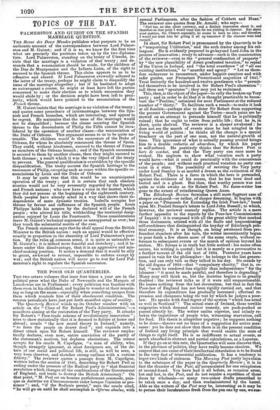TOPICS OF THE DAY.
PALMERSTON AND GUIZOT ON THE SPANISH MARRIAGE QUESTION.
'THE Revue des Deux Mondes publishes what purports to be an .authentic account of the correspondence between Lord Palmer- -ston and M. Guizot ; and if it is so, we know for the first time what are precisely the positions taken up by the two diploma- tists. Lord Palmerston, standing on the treaty of Utrecht, sista that the marriage is a violation of that treaty ; and de- mands that a renunciation should be made, for the children of the Duc de Montpensier and the Infanta Luisa, of the right to succeed to the Spanish throne. This claim appears to us to be offensive and absurd. If Lord Palmerston avowedly adhered to the letter of the treaty, perhaps he might claim to disqualify the issue of the marriage altogether; but if he hesitated to adopt so extravagant a course, he might at least have left the parties concerned to make their election as to which succession they would abide by ; or the decision might have been left to prox- imity, which would have pointed to the renunciation of the French throne.
M. Guizot insists that the marriage is no violation of the treaty ; and quotes some precedents of intermarriages between the Spa- nish and French branches, which are interesting, and appear to be cogent. He maintains that the issue of the marriage would not be disqualified ; because the clause securing the Spanish throne to the descendants of Philip the Fifth cannot be inva- -lidated by the operation of another clause—the renunciation of -the Duke of Orleans. This argument seems to us to be quite un- 'tenable. The children mould be the successors of the Duke of Orleans, for whom he absolutely renounced the throne of Spain. They could, without hindrance, succeed to the throne of France as members of the Orleans branch ; and if the Spanish succession is secured to them by another clause' then they might succeed to both thrones ; a result which it was the very object of the treaty to prevent. The general qualification is overridden by the specific disqualification. The treaty secures the Spanish heritage to the successors of Philip, excepting such as come within the specific re- nunciations by Louis and the Duke of Orleans.
It may be quite true that this would be an unanticipated operation of the treaty ; and it is certain that such obsolete niceties would not be very reverently regarded by the Spanish and French nations ; who now have a voice in the matter, which they did not possess at the beginning of the eighteenth century. Both peoples have already acted in a way that shows their, in- dependence of mere dynastic treaties. Isabella occupies her throne by favour and sufferance of the Spanish people. Louis Philippe holds his sceptre by the declared will of the French people ; who altered his title, withholding the territorial desig- nation enjoyed by Louis the Fourteenth. These considerations leave M. Guizot's technical argument as unsupported_as ever; but they touch the substantial merits of the case.
The French statesman says that he shall appeal from the British Minister to the British nation : such an appeal would be effective exactly in proportion to the absurdity of Lord Palmerston's posi- tion. By the rules .4 common sense, it is quite as untenable as M. Guizot's ; it is indeed more fanciful and crotchety ; and it la- bours under this disadvantage, that it is an aggressive and mis- chief-making position. It makes a demand that it would be silly to grant, awkward to retract, impossible to enforce except by war; and the British nation will never go to war for Lord Pal- merston's right to regulate the Spanish succession.


























 Previous page
Previous page